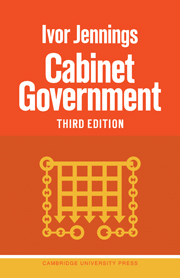Book contents
- Frontmatter
- Contents
- PREFACE
- CHAPTER I THE BRITISH CONSTITUTION
- CHAPTER II THE CHOICE OF A PRIME MINISTER
- CHAPTER III THE FORMATION OF A GOVERNMENT
- CHAPTER IV THE ADMINISTRATION
- CHAPTER V MINISTERS AT WORK
- CHAPTER VI INTER-DEPARTMENTAL RELATIONS
- CHAPTER VII TREASURY CONTROL
- CHAPTER VIII THE PRIME MINISTER
- CHAPTER IX THE CABINET
- CHAPTER X WAR AND DEFENCE
- CHAPTER XI ECONOMIC POLICY
- CHAPTER XII CONSTITUTIONAL MONARCHY
- CHAPTER XIII THE PERSONAL PREROGATIVES: DISMISSAL OF MINISTERS, DISSOLUTION OF PARLIAMENT, CREATION OF PEERS
- CHAPTER XIV PATRONAGE AND HONOURS
- CHAPTER XV GOVERNMENT AND PARLIAMENT
- APPENDIX I. GOVERNMENTS SINCE 1835
- APPENDIX II. EXAMPLES OF GOVERNMENTS
- APPENDIX III. THE PREROGATIVE OF DISSOLUTION
- APPENDIX IV. BIOGRAPHICAL AND BIBLIOGRAPHICAL NOTES
- INDEX
CHAPTER VIII - THE PRIME MINISTER
Published online by Cambridge University Press: 23 September 2009
- Frontmatter
- Contents
- PREFACE
- CHAPTER I THE BRITISH CONSTITUTION
- CHAPTER II THE CHOICE OF A PRIME MINISTER
- CHAPTER III THE FORMATION OF A GOVERNMENT
- CHAPTER IV THE ADMINISTRATION
- CHAPTER V MINISTERS AT WORK
- CHAPTER VI INTER-DEPARTMENTAL RELATIONS
- CHAPTER VII TREASURY CONTROL
- CHAPTER VIII THE PRIME MINISTER
- CHAPTER IX THE CABINET
- CHAPTER X WAR AND DEFENCE
- CHAPTER XI ECONOMIC POLICY
- CHAPTER XII CONSTITUTIONAL MONARCHY
- CHAPTER XIII THE PERSONAL PREROGATIVES: DISMISSAL OF MINISTERS, DISSOLUTION OF PARLIAMENT, CREATION OF PEERS
- CHAPTER XIV PATRONAGE AND HONOURS
- CHAPTER XV GOVERNMENT AND PARLIAMENT
- APPENDIX I. GOVERNMENTS SINCE 1835
- APPENDIX II. EXAMPLES OF GOVERNMENTS
- APPENDIX III. THE PREROGATIVE OF DISSOLUTION
- APPENDIX IV. BIOGRAPHICAL AND BIBLIOGRAPHICAL NOTES
- INDEX
Summary
The Prime Minister's Position
‘The Prime Minister’, said Mr John Morley, ‘is the keystone of the Cabinet arch.’ If that were all, it would be necessary first to examine the working of the Cabinet and then to consider the functions of its chairman. It would, however, be more accurate to describe the Prime Minister as the keystone of the Constitution.
He is, in the first place, the leader of his party. He will usually have been chosen as Prime Minister because he is the leader of the largest party in the House of Commons; and in other cases he will be elected leader as soon as he is appointed Prime Minister. Leadership of the party inside Parliament does not necessarily imply office in the party outside. The chairman of the Labour party is elected annually and for one year only. Nevertheless, the Prime Minister has to give effective leadership, particularly during a general election, when much depends on his personality, prestige, and even strategy; for though electioneering effects few conversions, it forces the waverers to decide whether to vote or not. There is, however, always an election round the corner, and the Prime Minister has to pay special attention to the popularity of his Government and the moods of public opinion. If it seems to be losing support, he has to consider whether to reverse the policy, to change its emphasis by starting a new and more popular line, or to send out his golden-voiced orators to prove to the electorate that it has been mistaken.
- Type
- Chapter
- Information
- Cabinet Government , pp. 173 - 227Publisher: Cambridge University PressPrint publication year: 1959



